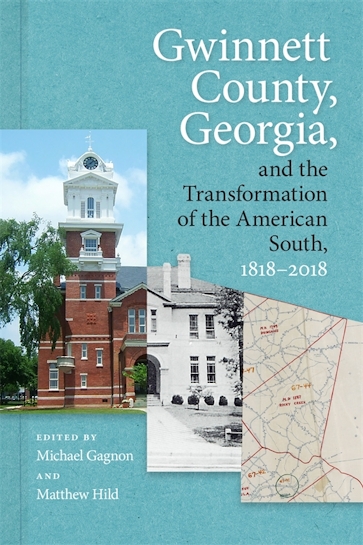Gwinnett County, Georgia, and the Transformation of the American South, 1818–2018
Title Details
Pages: 268
Illustrations: 11 b&w images
Trim size: 6.000in x 9.000in
Formats
Paperback
Pub Date: 07/15/2022
ISBN: 9-780-8203-6209-0
List Price: $36.95
Hardcover
Pub Date: 07/15/2022
ISBN: 9-780-8203-6210-6
List Price: $120.95
eBook
Pub Date: 07/15/2022
ISBN: 9-780-8203-6208-3
List Price: $36.95
eBook
Pub Date: 07/15/2022
ISBN: 9-780-8203-6820-7
List Price: $36.95
Related Subjects
HISTORY / United States / State & Local / South (AL, AR, FL, GA, KY, LA, MS, NC, SC, TN, VA, WV)
Gwinnett County, Georgia, and the Transformation of the American South, 1818–2018
A collection of essays that explore Gwinnett’s historical, economic, and cultural highlights
Skip to
- Description
- Reviews
- Awards
- Contributors
In Gwinnett County’s two hundred years, the area has been western, southern, rural, suburban, and now increasingly urban. Its stories include the displacement of Native peoples, white settlement, legal battles over Indian Removal, slavery and cotton, the Civil War and the Lost Cause, New South railroad and town development, Reconstruction and Jim Crow, business development and finance in a national economy, a Populist uprising and Black outmigration, the entrance of women into the political arena, the evolution of cotton culture, the development of modern infrastructure, and the transformation from rural to suburban to a multicultural urbanizing place. Gwinnett, as its chamber of commerce likes to say, has it all.
However, Gwinnett has yet to be the focus of a major historical exploration—until now. Through a compilation of essays written by professional historians with expertise in a diverse array of eras and fields, Michael Gagnon and Matthew Hild’s collection finally tells these stories in a systematic way—avoiding the pitfalls of nonprofessional local histories that tend to ignore issues of race, class, or gender. While not claiming to be comprehensive, this book provides general readers and scholars alike with a glimpse at Gwinnett through the ages.
—Paul M. Pressly, author of On the Rim of the Caribbean: Colonial Georgia and the British Atlantic World
—George Justice, author of Courthouses of Georgia
—William Brogdon, Georgia Library Quarterly
Winner
Award for Excellence in Documenting Georgia's History, Georgia Historical Records Advisory Council
Julia Brock
William D. Bryan
Richard A. Cook Jr.
Lisa L. Crutchfield
Edward Hatfield
Keith Hebert
R. Scott Huffard Jr.
David Mason
Marko Maunula
Erica Metcalfe
Katheryn L. Nikolich
David B. Parker
Bradley R. Rice
Carey Olmstead Shellman



